英语文体学Chapter 3 Surface-Structure Deviation
- 格式:ppt
- 大小:2.95 MB
- 文档页数:53
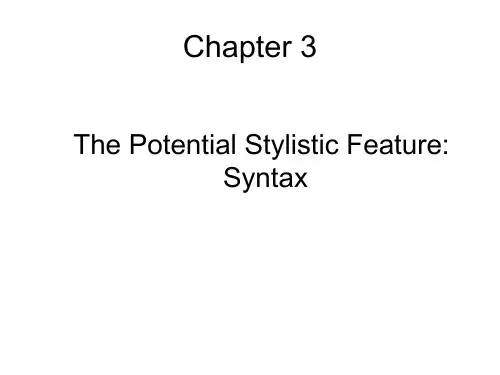
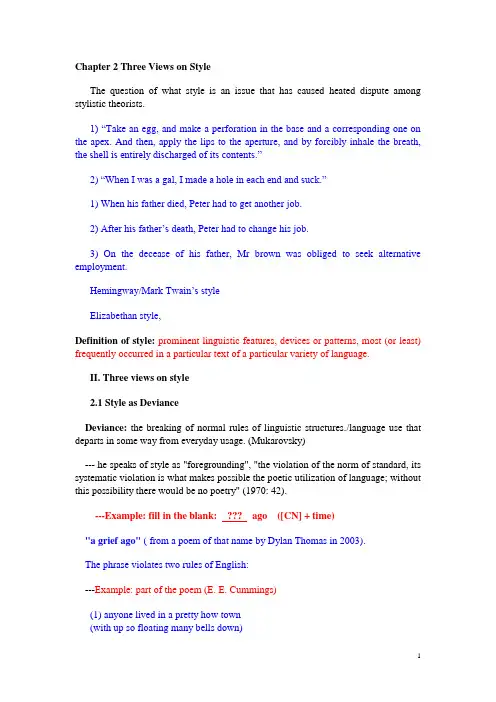
Chapter 2 Three Views on StyleThe question of what style is an issue that has caused heated dispute among stylistic theorists.1) “Take an egg, and make a perforation in the base and a corresponding one on the apex. And then, apply the lips to the aperture, and by forcibly inhale the breath, the shell is entirely discharged of its contents.”2) “When I was a gal, I made a hole in each end and suck.”1) When his father died, Peter had to get another job.2) After his father’s death, Peter had to change his job.3) On the decease of his father, Mr brown was obliged to seek alternative employment.Hemingway/Mark Twain’s styleElizabethan style,Definition of style:prominent linguistic features, devices or patterns, most (or least) frequently occurred in a particular text of a particular variety of language.II. Three views on style2.1 Style as DevianceDeviance: the breaking of normal rules of linguistic structures./language use that departs in some way from everyday usage. (Mukarovsky)--- he speaks of style as "foregrounding", "the violation of the norm of standard, its systematic violation is what makes possible the poetic utilization of language; without this possibility there would be no poetry" (1970: 42).---Example: fill in the blank: ago ([CN] + time)"a grief ago" ( from a poem of that name by Dylan Thomas in 2003).The phrase violates two rules of English:---Example: part of the poem (E. E. Cummings)(1) anyone lived in a pretty how town(with up so floating many bells down)spring summer autumn winterhe sang his didn't he danced his didWomen and men (both little and small)cared for anyone not at allthey sowed their isn't they reaped their samesun moon stars rain2.2 Style as Choice--- style as choice means that style "results from a tendency of a speaker or writer to consistently choose certain structures over others available in the language" (Traugott and Pratt, 1980: 29).---not necessarily a conscious choice.--- can be purely intuitive or even habitual choice.Example:Dear Sir,I must apologize for the delay in repying to your letter of the 30th of December…Dear Jane,I’m terribly sorry not to have got round to writing before now….--- Style as choice is a matter of form or expression, i. e. as choice among different ways of expressing a predetermined content. However, it only takes a moment or two to reflect that writers also choose content.---"Hemingway selects to write about men of action - bull fighters, deep-sea fishermen, soldiers, big-game hunters - is as much a stylistic fact as his habit of writing in short, simple sentences, preferring the 'dramatic' to the 'interior monologue' point of view in narration, etc." (Chatman, 1971: 64).---The evidence of choice-making can be found in authors' manuscripts.Example:The Eve of St. Agnes by KeatsCompare: 'As though a rose should close and be a bud again' (first version).'As though a rose should shut and be a bud again'.(revised version)2.3 Style as Foregrounding---In literature first by the pre-war Prague School linguists such as Mukarovsky---Def: unexpected departures from the accepted norms. Foregrounding includes both the deviant features and those linguistic phenomena which are not deviant, but nevertheless striking.(1) When he laughed, respectable senators burst with laughter,And when he cried the little children died in the streets.(W. H. Auden, Epitaph on a Tyrant)----The view of style as foregrounding is explained in Short'sA. When a writer writes he is constantly involved in making linguistic choices - choices between one word and another, one structure and another, and so on.B. Examination of the choices that he makes (as opposed to the ones that he rejects) can help us to understand more fully the meaning he is trying to create and the effects he is striving to achieve.C. He can make choices both inside and outside the language system. Choices outside the language system are deviant and thus produce foregrounding.D. Overregularity of a particular choice within the system (e.g. parallelism) also produces foregrounding.(Short, 1984: 21)---foregrounding is achieved either through deviation or through overregularity in language use. Deviation can be investigated and classified according to its linguistic level.--- In A Linguistic Guide to English Poetry, Leech (1969) identifiessurface-structure deviation: phonological, graphological, grammatical, lexical, deep-structure deviation: semantic deviationperiodthere are also dialectal deviation; deviation of register and deviation of historical。
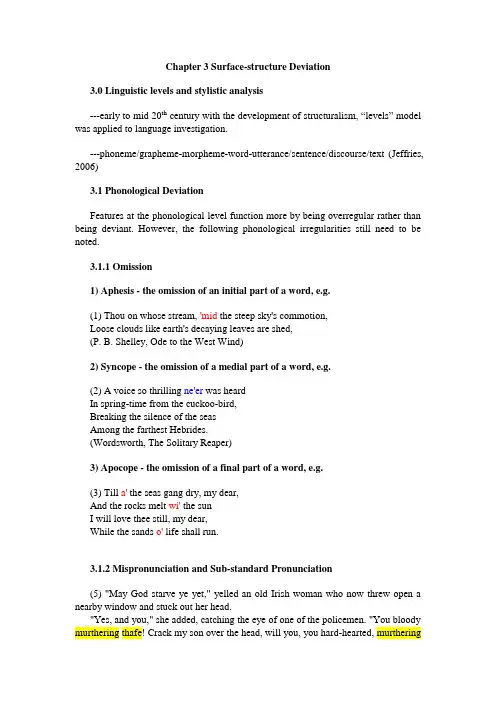
Chapter 3 Surface-structure Deviation3.0 Linguistic levels and stylistic analysis---early to mid 20th century with the development of structuralism, “levels” model was applied to language investigation.---phoneme/grapheme-morpheme-word-utterance/sentence/discourse/text (Jeffries, 2006)3.1 Phonological DeviationFeatures at the phonological level function more by being overregular rather than being deviant. However, the following phonological irregularities still need to be noted.3.1.1 Omission1) Aphesis - the omission of an initial part of a word, e.g.(1) Thou on whose stream, 'mid the steep sky's commotion,Loose clouds like earth's decaying leaves are shed,(P. B. Shelley, Ode to the West Wind)2) Syncope - the omission of a medial part of a word, e.g.(2) A voice so thrilling ne'er was heardIn spring-time from the cuckoo-bird,Breaking the silence of the seasAmong the farthest Hebrides.(Wordsworth, The Solitary Reaper)3) Apocope - the omission of a final part of a word, e.g.(3) Till a' the seas gang dry, my dear,And the rocks melt wi' the sunI will love thee still, my dear,While the sands o' life shall run.3.1.2 Mispronunciation and Sub-standard Pronunciation(5) "May God starve ye yet," yelled an old Irish woman who now threw open a nearby window and stuck out her head."Yes, and you," she added, catching the eye of one of the policemen. "You bloody murthering thafe! Crack my son over the head, will you, you hard-hearted, murtheringdivil? Ah, ye-"(T. Dreiser, Sister Carrie)(6) 'Arve moved,' he said, 'Darn ear.''And all the click?' I asked him. 'All the notorious Dockhead boys?''Not v'click,' said Ed-Ted. 'Jus me.'...'And why, Ed,' I said, 'have you moved darn ear?''Cos me Ma as,' he said. 'She's bin re-owsed.''So you still live with Momma?' I enquired.'Course,' he said.'Big boys like you hasn't got his own hidey-hole?' I asked.'Lissen,' he said. 'I respect my Mar.''Cool, man,' I said. 'Now tell me. What about the mob, the click? Have they been re-owsed as well?''Ner,' he said.'Ner? What, then?''The click's split up.''You mean,' I said, 'that bunch of tearaways have thrown you out?''Eh-y?' he cried.'You heard, Ed. You've been expelled from the Ted College?''Naher! Me? Espel me? Wot? Lissen! Me, R lef them, see? You fink I'm sof, or sumfink?'(C. Maclnnes, Absolute Beginners)Compare the version rewritten in standard English'I've moved,' he said, 'down here.''And all the clique,' I asked him. 'All the notorious Dock-head boys?''Not the clique,' said Ed-Ted. 'Just me.'...'And why, Ed,' I said, 'have you moved down here?''Because my Ma has,' he said. 'She's been re-housed.''So you still live with Momma?' I enquired.'Course,' he said.'Big boys like you hasn't got his own little hidey-hole?' I asked.'Listen,' he said. 'I respect my ma.''Cool, man,' I said. 'Now, tell me. What about the mob, the clique?Have they been re-housed as well?''No,' he said.'No? What, then?''The clique's split up.''You mean,' I said, 'that bunch of tearaways have thrown you out?''Eh?' he cried.'You heard, Ed. You've been expelled from the Ted College?''No! Me? Expel me? What? Listen! Me, I left them, see? You think I'm soft, or something?'3.1.3 Special PronunciationFor convenience of rhyming, the poet may give special pronunciation to certain words, e.g.(7) The trumpet of a prophecy! O, Wind,If winter comes, can spring be far behind?(P. B. Shelley, Ode to the West Wind)3.1.4 AlliterationDef: adjacent words beginning with the same property of phonemes.Example: a strapline by a public service workers’ union:CAMERON’S CRONIES CASHING IN ON CREDIT CRUNCH.Example:Up on the Moors with KeeperThree girls under the s un’s rare brillian ceout on the moors, hitching their skirtsover bog-myrtle and bilberry.They’ve kicked up their heel s at a dull brotherwhose keep s till can’t you? Want s to fixthem to canvas. Emily’s dog stares at thesethree girls under juggling larkspausing to catch that song on a hesitant wind,all wings and faces dipped in light.What could there be to match this glory?High summer, a scent of absent rain,away from the dark house, father and duty.(Dooley, 1991:66)3.1.5 AssonanceThey’ve k icked up their heels at a dull brotheraway from the dark house, father and duty.3.1.6 RhymeDef: two or more words ending with a stressed syllable, where the vowel and the final consonants are the same.1. RhymeOff with that girdle, like heaven’s zone glitter ing,But a far fairer world encompassing.Unpin that spangled breast-plate, which you wear,That th’eyes of busy fools may be stopp’d there.Unlace yourself, for that harmonious chimeTells me from you that now it is bed-time.(Donne, 1896)2. Reverse rhyme & half-rhyme & internal rhymeReverse rhyme: a match btw the first consonant cluster and the vowel match (slip/slim)Half-rhyme: the sameness of only the final consonant (clap/trip)And if I spy into its golden loopsI see us walk between the railway slopesInto an evening of long grass and midgesBlue smoke straight up, old beds and ploughs in hedges(Seamus Heaney, 1982)Internal rhyme: conventional rhymes but within the same line of poetry.the resin of the wood would somehow catchin patina the pattern of his tread-3.1.7 Sound symbolism---Language can not only provide musical effect, but to symbolize directly the meaning it represents.---besides onomatopoeic words (clap, bang, splash), the potential of individual sounds to be iconic in particular contexts is a well-used resource for writers.A plump splashon tense, bare skin……whitedownpours shudderlike curtains, rinsingtight hairdos to innocence(France, 1993:118)---whole category of sounds can also be onomatopoeicSibilants: rain, wind, sign, breathlessnessPlosives, esp. /p/ /t/ /k/ short & sharp, gunfire, knocks on door or thunder, Nasals, voiced, resonant, bells, singing, musical or quasi-musical sounds like clang of an iron doorVowels: close front vowels, with high pitch, youth, high spiritedOpen back vowels: dull, drudgery---length of sounds is also symbolicPlosives: short, sharp,Close front vowels: smallness, rapid movementOpen back vowels / diphthongs: large size, slow long lasting action---From “the Prelude” by Wordsworth who panics as he rows across the lake when the mountains seems to come after himA huge peak, black and huge,As if with voluntary power instinctUpreared its head. I struck and struck again---From “Anthem for doomed youth” by Wilfred Owen about the dead of WWIAnd each slow dusk a drawing-down of blinds.3.2 Graphological Deviation (书写变异)Graphological deviation can occur in any sub-area of graphology, such as the shape of the text, the type of print, grammetrics, punctuation, indentation3.2.1 Shape of TextThe shape of a piece of literary work, especially a poem, can be designed in an unconventional way so that it may be suggestive of a certain literary theme.---concrete poems & visual poems---shape of a poem may echo the meaningFrom “l(a” by e.e. cummingsl(aleaffalls)onelinessFrom “40-Love” by R. McGough40-Love3.2.2 Type of PrintLiterary writers also choose to express their ideas by manipulating the type of print which may include italics, bold print, capitalization and decapitalization capitalization and de-capitalization of the pronouns in the poem, Me up at does.(9) Me up at doesout of the floorquietly Starea poisoned mousestill who aliveis asking whathave i done thatYou wouldn't have(E. E. Cummings)--- syntactic deviation: some change in meaning if we rewrite the verse???a poisoned mousewho still alivedoes Stare up at Me quietlyout of the flooris asking whathave i done thatYou wouldn't have3.2.3 GrammetricsDef: the ways in which grammatical units are fitted into metrical units such as lines and stanzas.---a short poem by William Carlos Williams(10) This Is Just to SayI have eatenthe plumsthat were inthe ice-boxand whichyou were probablysavingfor breakfastForgive methey were deliciousso sweetand so coldThis Is Just to Say =>I have eaten =>the plums =>that were in =>the icebox →and which =>you were probably =>saving =>for breakfast →Forgive me →they were delicious →so sweet →and so cold →3.3 Syntactic DeviationSyntactic deviation refers to departures from normal (surface) grammar. These include a number of features such as unusual clause themes, unusual phrase structures.3.3.1 Unusual Clause Theme (thematic fronting)---Theme:The initial unit of a clause. the theme is the most important part of a clause from the point of view of its presentation of a message in sequence. The theme may be characterized as the communicative departure for the rest of the clause.---"unmarked" theme:1. Subject of an indicative clause: (She) got a new dress.2. Auxiliary in a yes-no question: (Did) she get a new dress?3. Wh-element in a wh-question: (Which) dress did she get?4. Main verb in an imperative clause: (Get) a new dress for her.--- 'marked' theme: any of the rest of clause elements in the thematic position. the literary writer can use marked theme to achieve certain literary effect.(11) My opinion of the coal trade on that river is, that it may require talent, but it certainly requires capital. Talent Mr. Micawber has, capital Mr. Micawber has not.(Dickens, David Copper field)(13) Out of the bosom of the Air,Out of the cloud-folds of her garments shaken,Over the woodlands brown and bare,Over the harvest-fields forsaken,Silent, and soft, and slowDescends the snow.(Snowflakes)Homework: (14) Parting at MorningRound the cape of a sudden came the sea,And the sun looked over the mountain's rim,And straight was a path of gold for him,And the need of a world of men for me.(R. Browning)3.4 Lexical Deviation---Lexical deviation in literature refers almost exclusively to neologisms or the coinage of new words.The new words that the literary writer invents are usually made up for use on only one particular occasion, and can therefore be called 'nonce-formations'.3.4.1 AffixationAffixation is the addition of a prefix or suffix to an item which already exists in the language. The following lines contain some typical examples of words coined by extension of this rule:(17) And I Tiresias have foresuffered all.(T. S. Eliot)(18) There was a balconyful of gentlemen.(Chesterton)(19) We left the town refreshed and rehatted.(Fotherhill)the coinage balconyful affords a vivid description of the number of people staying on the balcony, thus making the work interesting to read.Rehatted in (19) this coinage is in phonetic harmony with its parallel refreshed and thus produces a humourous and comic effect.3.4.2 CompoundingCompounding is the combination of two or more items to make a single compound one. Consider the following examples:(20) While I, joy-jumping, empty-eyed sang on the day my father died.(Edwin Brook)(22) They were else-minded then, altogether, the men(G. M. Hopkins)3.4.3 ConversionConversion, which is often described as 'zero affixation', is the adaptation of an item to a new grammatical function without changing its form.(24) "Don't be such a harsh parent, father!""Don't father me!"(H. G. Wells)(25) I was explaining the Golden Bull to his Royal Highness,"I'll Golden Bull you, you rascal!" roared the Majesty of Prussia.(Macaulay)Exercises1. Define the following terms.grammetrics marked theme apocopeaffixation compounding conversiongraphology aphesis syncope2. Identify the types of omission in the following and supply the complete forms of the words that are partly omitted.1) "Forward, the Light Brigade!"Was there a man dismay'd?Not tho' the soldier knowSome one had blunder'd:Theirs not to make replyTheirs not to reason why,Theirs but to do and die:Into the valley of DeathRode the six hundred.(Tennyson, The Charge of the Light Brigade)2) I Wander thro' each chartere'd street,Near where the charter'd Thames does flow,And mark in every face I meetMarks of weakness, marks of woe.(W. Blake, London)3) Learn then what morals critics ought to showFor 'tis but half a judge's task, to know.(A. Pope, An Essay on Criticism)4) Th' Applause of list'ning Senates to command,The Threats of Pain and Ruin to despise,To scatter Plenty o'er a smiling Land,And read their Hist'ry in a Nation's Eyes.(Thomas Gray, Elegy Written in a Country Churchyard)3. Discuss the stylistic effects of the sub-standard pronunciations in the following passages.1) 'Now, what do you complain of?' asked Mr Bounderby.'I ha' not coom here. Sir,' Stephen reminded him, 'to complain. I coom for that I were sent for.''What,' repeated Mr Bounderby, folding his arms, 'do you people, in a general way, complain of?'Stephen looked at him with some irresolution for a moment, and then seemed to make up his mind.'Sir, I were never good at showin' o't, though I ha' had'n my share in feeling o't. 'Deed we are in a muddle, Sir. Look round town - so rich as 'tis - and see the numbers o people as has been broughten into bein heer, fur to weave, an' to card, an' to piece out a livin', aw the same one way, somehows, 'twixt their cradles and their graves. Look how we live, an' wheer we live, an' in what numbers, an' by what chances, and wi' what sameness; and look how the mills is awlus a goin, and how they never works us no nigher to onny dis'ant object - ceptin awlus, Death. Look how you considers of us, and writes of us, and talks of us, and goes up wi'yor deputations to Secretaries o' Stats 'bout us, and how you are awlus right, and how we are awlus wrong, and never had'n no reason in us sin ever we were born, Look how this ha' growen an' growen,Sir, bigger an' bigger, broarder an' broarder, harder an' harder, fro year to year, fro generation unto generation. Who can look on't, Sir, and fairly tell a man 'tis not a muddle?''Of course,' said Mr Bounderby. 'Now perhaps you'll let the gentleman know, how you would set this muddle (as you're so fond of calling it) to rights.''I donno, Sir, I canna be expecten to 't. 'Tis not me as should be looken to for that, Sir. 'Tis them as is put ower me, and ower aw the rest of us. What do they tak upon themseln, Sir, if not to do 't?''I'll tell you something towards it, at any rate,' returned Mr Bounderby. 'We will make an example of half-a-dozen Slackbridges. We'll indict the blackguards for felony, and get 'em shipped off to penal settlements.Stephen gravely shook his head.'Don't tell me we won't, man,' said Mr Bounderby, by this time blowing a hurricane, 'because we will, I tell you!''Sir,' returned Stephen, with the quiet confidence of absolute certainty, 'if yo was t' tak a hundred Slack-bridges - aw as there is, and aw the number ten times towd - an' was't sew 'em up in separate sacks, an' sink 'em in the deepest ocean as were made ere ever dry land coom to be, yo'd leave the muddle just wheer 'tis, Mischeevous Strangers!' said Stephen, with an anxious smile; 'when ha' we not heern, I am sure, sin ever we can call to mind, o' th' mischeevous strangers! 'Tis not by them the trouble's made, Sir. 'Tis not wi' them 't commences. I ha' no favour for 'em - I ha' no reason to favour 'em - but 'tis hopeless and useless to dream o' takin them from their trade, 'stead o' takin their trade from them! Aw that's now about me in this room were heer afore I coom, an' will be heer when I am gone. Put that clock aboard a ship an' pack it off to Norfolk Island, an' the time will go on just the same. So 'tis wi' Slackbridge every bit.'(Charles Dickens, Hard Times)2) "Say you're not drunk!" she flashed."Say you're not drunk," he repeated. "Why, nobody but a nasty little bitch like you 'ud 'ave such a thought."He thust his face forward at her."There's money to bezzle with, if there's money for nothing else.""I've not spent a two-shillin' bit this day," he said."You don't get as drunk as a lord on nothing," she relied. "And," she cried, flashing into sudden fury, "if you've been sponging on your beloved Jerry, why let him look after his children, for they need it.""It's a lie, it's a lie. Shut your face, woman."They were now at battle-pitch. Each forgot everything save the hatred of the other and the battle between them. She was fiery and furious as he. They went on till he called her a liar."No," she cried, starting up, scarce able to breathe. "Don't call me that - you, the most despicable liar that ever walked in shoe-leather." She forced the last words out of suffocated lungs."You're a liar!" he yelled, banging the table with his fist. "You're a liar, you're a liar."She stiffened herself, with clenched fists."The house is filthy with you," she cried."Then get out on it - it's mine. Get out on it!" he shouted. "It's me as brings th' money whoam, not thee. It's my house, not thine. Then ger out on't - ger out on't!""And I would," she cried, suddenly shaken into tears of impotence. "Ah, wouldn't I, wouldn't I have gone long ago, but for those children. Ay, haven't I repented not going years ago, when I'd only the one" - suddenly drying into rage. "Do you think it's for you I stop - do you think I'd stop one minute for you?"(Lawrence, Sons and Lovers)4. Discuss the graphological features in the poems below.1) A Christmas TreeStarIf you areA love compassionate,You will walk with us this year,We face a glacial distance, who are hereHuddledAt your feet(W. S. Burford)2) rainbowrainbow youre a twofaced sortof fellowyoure a warped candybarand the sun uses youas a weapon against the shadowof the rainrainbow youre not a selfmadechap atallyoure just a compound of enemiesand the only reasonanybody likes you is because without youtheyd be nothing(William Peskett)3) l(aleaffalls)oneliness(E. E. Cummings)5. Comment on the translation of the pagoda-shaped poem in The Scholars by Yang Xianyi and Gladys Yang below.呆A秀才Foolish scholar吃常斋Fasted so long胡须满腮Whiskers covered his cheeks经书不揭开Neglecting to study the classics纸笔自己安排He left pen and paper aside明年不请我自来He'll come without being invited next year6. Consider how the grammatical units are fitted into the metrical units of the poem below. What is the effect of this arrangement?Dust of SnowThe way a crowShook down on meThe dust of snowFrom a hemlock treeHas given my heartA change of moodAnd saved some partOf a day I had rued.(Robert Frost)7. The following stanzas and passages contain examples of unusual clause themes. Pick them out and comment on their stylistic effects.1) Half a league, half a league,Half a league onward,All in the valley of DeathRode the six hundred."Forward, the Light Brigade!Charge for the guns," he said:Into the valley of DeathRode the six hundred.(Tennyson, Charge of the Light Brigade)2) Down came his whip and away we clattered.I never had such a shaking up in my life. The recent flooding rains had washed the road clear away in places. But we never stopped, we never slowed down, for anything.(Mark Twain, A Tramp Aboard)3) Heavy is my heart,Dark are thine eyes.Thou and I must partEre the sun rise.(Mary Coleridge, Slowly)4) "Stop thief! Stop thief!" There is a magic in the sound. The tradesman leaves his counter, and the carman his waggon; the butcher throws down his tray ... Away they run, pell-mell, helter-skelter, yellow-screaming, knocking down the passengers as they turn the corner, rousing up the dogs..."Stop thief! Stop thief!" the cry is taken by a hundred voices, and the crowds accumulate at every turning. Away they fly, splashing through the mud, up go the windows, out ran the people.(Charles Dickens)5) Continuous as the stars that shineAnd twinkle on the milky way,They stretched in never-ending line,Along the margin of a bay:Ten thousand saw I at a glance,Tossing their heads in sprightly dance.(Wordsworth)8. Comment on the following line which contains a phrase that is structurally deviant. Note the line is spoken by Caesar's friend, Mark Antony, at Caesar's funeral.This is the most unkindest cut of all!(Shakespeare, Julius Caesar)9. Identify the type of lexical deviation in the following and discuss their stylistic significance.1) Lord I am not entirely selfishLord I am not entirely helpishO lord to me be slightly lavishO lord be in a minor way lovish(Gavin Edwart, Prayer)2) His bright replacement, present-minded, stays(Howard Nemerov, Absent-minded Professor)3) The Bravest SoldierBrave, brave were the soldiers (high-named today) who lived through the fight;But the bravest press'd to the front and fell, unnamed, unknown.(Walt Whitman)4) Valuing himself not a little upon his elegance, being indeed a proper man of his person, this talkative now applied himself to his dress.(James Joyce, Ulysses)。
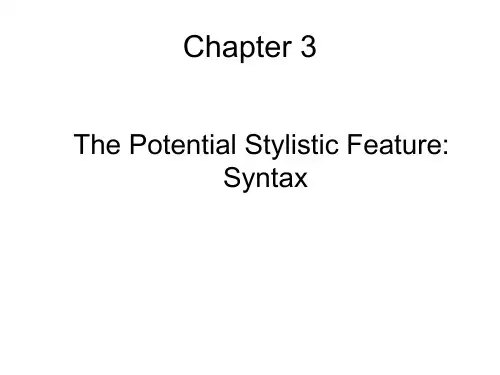
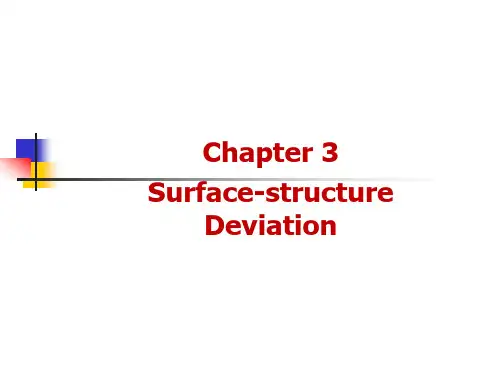
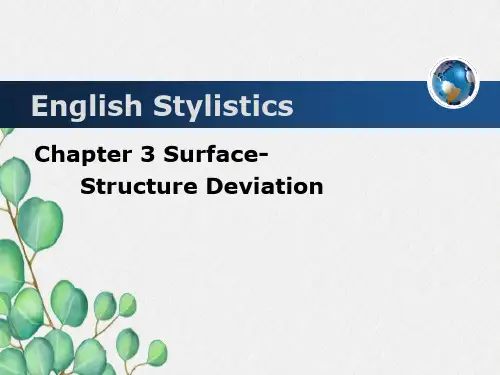
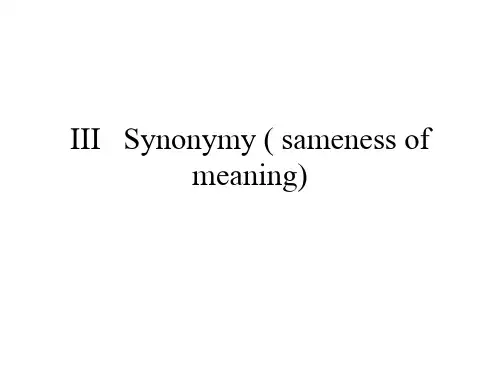
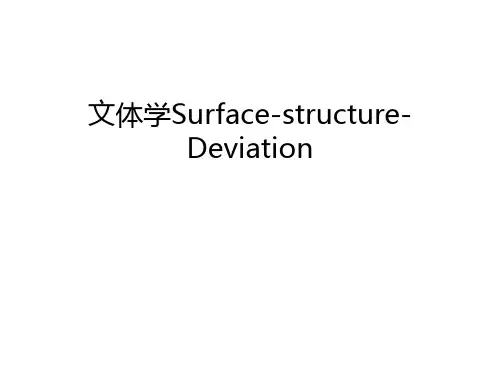
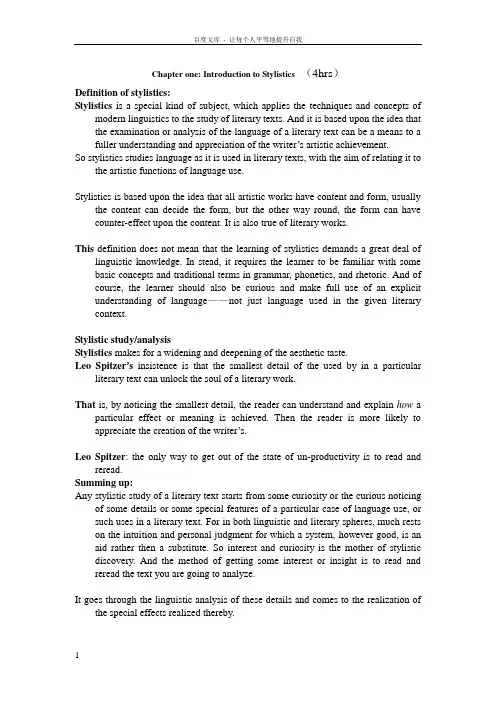
Chapter one: Introduction to Stylistics(4hrs)Definition of stylistics:Stylistics is a special kind of subject, which applies the techniques and concepts of modern linguistics to the study of literary texts. And it is based upon the idea that the examination or analysis of the language of a literary text can be a means to a fuller understanding and appreciation of the writer’s artistic achievement.So stylistics studies language as it is used in literary texts, with the aim of relating it to the artistic functions of language use.Stylistics is based upon the idea that all artistic works have content and form, usually the content can decide the form, but the other way round, the form can have counter-effect upon the content. It is also true of literary works.This definition does not mean that the learning of stylistics demands a great deal of linguistic knowledge. In stead, it requires the learner to be familiar with some basic concepts and traditional terms in grammar, phonetics, and rhetoric. And of course, the learner should also be curious and make full use of an explicit understanding of language——not just language used in the given literary context.Stylistic study/analysisStylistics makes for a widening and deepening of the aesthetic taste.Leo Spitzer’s insistence is that the smallest detail of the used by in a particular literary text can unlock the soul of a literary work.That is, by noticing the smallest detail, the reader can understand and explain how a particular effect or meaning is achieved. Then the reader is more likely to appreciate the creation of the writer’s.Leo Spitzer: the only way to get out of the state of un-productivity is to read and reread.Summing up:Any stylistic study of a literary text starts from some curiosity or the curious noticing of some details or some special features of a particular case of language use, or such uses in a literary text. For in both linguistic and literary spheres, much rests on the intuition and personal judgment for which a system, however good, is an aid rather then a substitute. So interest and curiosity is the mother of stylistic discovery. And the method of getting some interest or insight is to read and reread the text you are going to analyze.It goes through the linguistic analysis of these details and comes to the realization of the special effects realized thereby.The relation between stylistics and linguisticsLanguage plays the role of conceptualization and communication of meaning.1. Both st ylistics and linguistics are subjects that take language as their object ofstudy. They differ only in that the linguistics aims at the general and abstract aspects of language, ie. langue, while stylistics aims at the particular cases of language use, ie. speech/parole, together with special effect realized thereby.2. Stylistics is the application of linguistics to the study of literature.Stylists are interested in the details of the language used by certain writers in a certain text, and they look through these details to its significance.3. One of the major concerns of stylistics is to check or validate intuitions by detailedanalysis, but it is also a dialogue between a literary reader and a linguistic observer, and the goal of this dialogue is insight rather than objectivity.Linguistic analysis does not replace reader’s intuition, more importantly, it can prompt, direct, and shape it into an understanding.4. Stylistics builds on linguistics, and in return, it also challenges our linguisticframework, it always opens our eyes to the new horizons of our understanding of language and language use.The relation in between is a dialectical one.Different definitions of style:1. The most traditional definition of style is that style is a writer’s way/manner ofwriting or his mode of expression. This is a kind of dualist view about language based upon the belief that concerning language use there can be two aspects, namely, the content and the form. And some hold that style itself is part of the meaning or a component of the content of a form.2. Style as the dress of thought. This definition implies that style refers to the waysaying what one has to say.True wit is nature to advantage dressed,What oft was thought but n’er so well expressed.3. Style is manner of expression or manner of writing. So here in this definition,speech act is treated as the same as other common kinds of acts, the personal way of behaving forms the style of the person in question.4. Right word in the right place make a good style.Sum-up:1.Style is a way in which language is used, so it is related to parole rather thanlangue.2.Style consists in choices made from the repertoire of the language.3.Stylistic choice is limited to those aspects of linguistic choice which concernalternative ways of saying the same thing or of rendering the same subject matter.4. A style is defined in terms of a domain of language (what person said what inwhat place, what linguistic context, what manner, and for what purpose).5.Stylistics has been typically concerned with literary language.6.Literary stylistics is typically concerned with explaining the relation between styleand literary or aesthetic functions.StylisticsLecture Two: Introduction to Stylistics(continued)Leech defines stylistics as the study of the use of language in literature and considers it as the meeting ground of linguistics and the study of literature. So stylistics straddles two disciplines: linguistics and literary criticism.Stylistics is an interdisciplinary subject. It is a study of literary discourse from a linguistic orientation, that is, form a linguistic point of view. Therefore, it differs from linguistics and literary criticism in that it essentially links these two. In other words, it is an interdisciplinary subject.The start of this interdisciplinary subject:It is hard to determine when it became an academic field of study. But one thing is sure, that is, it did not achieve significant development as an independent subject until the late 1950’s. Now it has become a firmly established subject, which is supposed to provide useful insights into literary criticism and the teaching of literature.The basis on which stylistics has developed is English rhetoric, which can be traced back to Aristotle’s time.There have been three movements that promoted the development stylistics:1.Modernist movement in art and literature, which lasted from 1890 to World War II.This movement is characterized by its break away fro the tradition. This break away lifted all restraints upon the content and language used in art and literature.This led to the tolerance, acceptance, and appreciation of the different kinds of language that appear in literature and art.2.Another revolution occurred in the field of literary criticism, which had aprofound radical influence upon stylistics. The most important proponent of this revolution is I. A. Richards, who was dissatisfied with the criticism of his age for in his opinion the critics of his time had given too much attention to the moral aspect of literature, and he suggested that a more objective approach should be taken towards literary criticism. He based his approach upon close reading of the literary text and linguistic analysis of the language of the text.3.The third revolution that had helped the emergence of stylistics is the one thattook place in the science of linguistics in the late 1950’s. This revolution was initiated by the work of Noam Chomsky and Michael Halliday whose thoughts were directly or indirectly influenced by the linguistic theory of F. De Sassure.And generally speaking, the development in the domain of linguistics provided the stylisticians/stylists with effective and new tools for analyzing the language in use in both literature and other types of discourse.So the modernist movement aesthetically prepared the public or society for receiving and ushering in a new kind of literary criticism——stylistics.The neo-criticism directly enhanced the development of this new subject advocating objective analysis of the language of a literary text as the basis of literary criticism. The development of linguistics in the 1950’s supplied literary critics with the necessary and effective tools for investigating the language use in literary texts. So these three movements actually provided everything necessary for the appearance of this new subject.Two important assumptions of stylistics1.One important assumption of stylistics is that literature is made of language. It isan art of language. Now that literature is made of language, linguistics, which is the scientific study of language, is naturally helpful to us in analyzing and interpreting literary text.2.The second assumption is that literature is a type of communicative discourse.This assumption is just as important and basic as the first one. This assumption implies that, as Widdowson explicitly stated, a piece of language use, literary or otherwise, is invariably a piece of communication, a discourse of one kind or another. This assumption requires that one should understand the linguistic features of a literary text as occurring not randomly but rather with some meaning in it. These features are determined and also should be interpreted in reference to the context in which the communication occurs. This assumption extends the scope of the linguistic study of the language used in a literary text fro intra-sentential study to inter-sentential study.The first assumption justifies the necessity of the linguistic analysis of the literary text in the study of a literary work, while the second assumption puts the analysis of the language of the literary text in connection with context——both linguistic and social context.The goals, components, and procedure of stylistic inquiryGoalsThe first goal of stylistics is to help readers understand a literary text better. In other words, it provides insights into the meaning of the text.The second goal is to explain why and how one text is better than another one. That is to say that it is with interpretation that stylistics is more directly concerned.ComponentsDescription +interpretation +evaluationThe most important thing is to remember there is actually no rigid and fixed procedure of stylistic analysis of literary work. Linguistic observation and literary insight proceeds from each other and enhances each other and they form a cyclic motion.Procedure: Analytic phase +interpretative phaseThe nature of stylistic analysisGenerally, the stylistic analysis is mainly concerned with the uniqueness of the language use in a literary text. That is, to show what is peculiar to the language in a literary text. This is determined by the nature of style itself. This naturally involves comparison between the language used in the literary text under investigation and the language used in a conventional way.So essentially speaking, stylistic study is essentially comparative in nature.Lecture Two: Three Views of StyleWe have seen the definition of stylistics and some definitions of style.Next we will see some most influential and representative views of style.Text book p11Style as form. (Aristotle)(form and content )Style as eloquence.(Cicero)(skill to use L persuasively)(the relation with rhetoric)Style is the man. (Buffon)(L use is using it in discourse)Style as personal idiosyncrasy.(Murry)Saying the right thing in the most effective way.(Enkvist)Style as the choice between alternatve expressions. (Ibid)Style as equivalence. (Roman Jacobson)(between form and function)Style as foregrounding. (Leech Mukarovsky)Style as deviation.(Mukarovsky & Spitzer)Style as prominence.(Halliday)Style as the selections features partly determined by the demands of genre, form, themes, etc. (Traugott & Pratt)Style as linguistic features that communicate emotions and thought.(Enkvist)When writers write, they will naturaly try to make their language difffernt from the others’, so as to attract the attention of the readers and also to ensure and secure an independent existence. Or to stand out from the multitude of men of letters. Or just a special position for his writing. And that is to depart from the normal way of expression in a certain sense.Style as deviance.This view of stylistics comes from Widdowson’s remark of style holding that stylistic analysis has no fixed procedure and the technique of doing this kind of analysis is to pick on features in the text which appear to first impressions as unusual or striking in some way and then explore their ramifications. This remark implies that only those unusual or striking features are stylistically relevant. And the implied assumption is that the literary aesthetic effects can only be achieved through deviance. Though some stylisticians hold different views.It leads to such an assumption as that the distinctiveness of a literary text lies in its departure from the characteristics of what is communicatively normal. It also gives birth to the approach to style as deviance from the norms of a given language.Mukarovsky is another famous proponent and founder of this view of style. In his famous article Standard Language and Poetic Language, he speaks of style as foregrounding.He asserts that the violation of the norm of standard, especially, its systematic violation, is what makes possible the poetic utilization of language; without this possibility there would be no poetry. According to Mukarovsky normal use of language “automatizes”language to such an extent that the users no longer see its expressive or aesthetic power; poetry must de-automatize or foreground language by breaking the rules of everyday language. P13Such as the expression “a grief ago”“a presidency ago”“Mr. Smarter”“Mr. Bumble””The advantage of this approach to style is that it helps us keep in mind the there is a difference between everyday language and the language of literature.The disadvantages are that:a.It is difficult to define the norm from which the style of a text deviates.Bloch considers the basis of norm to e statistical, that is, to determinestyle by counting or resorting to the frequency distributions of linguisticfeatures as they differ from that of the language as a whole.b.It tends to lead the readers and stylisticians to value only the language ofthe grammatically highly deviant authors and under value those authorsthat do not deviate or do not deviate so much from the norms of language.And generally speaking, it tends to lead underestimation of thenon-deviant language both within literature and without.Style as choice.Style results from a tendency of speaker or writer to consistently choose certain structures over others available in the language.The difference between L and style is that L is the sum total of the structuresavailable to the speaker, while style concerns the characteristic choices by a certain writer either consistently or in a given text or context.To say that style is choice of words is not the same thing as saying that it is always a conscious choice, though of course if the writer always chooses his word scrutinously the effect of his way of using L will be all the more obvious as a style. Then that is pick his way forward among words, and it is hard to imagine how much literary work can there be by now. The stock of literature of we human kind no doubt will be greatly diminished. But most, almost all poets, and some writers, and all writers at certain points in their writing do write that way, that is, they a kind of choose scrutinously and seem to pick their way forward among the forest of words. . we Chinese posts have a tradition of refining words. 吟得一字安,捻断数茎须。

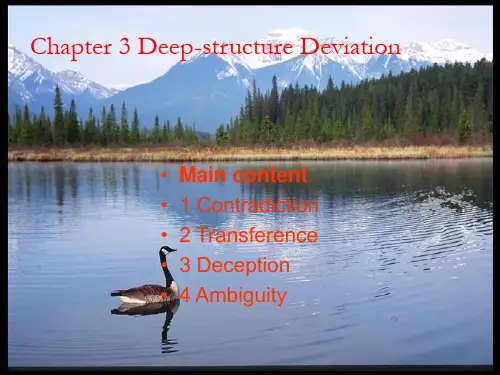
Chapter 4 Deep-structure DeviationDeep-structure deviation refers to semantic deviation, which may be defined as "linguistic effects involving something odd in the cognitive meaning of a certain linguistic unit, e.g., a word or phrase" (Leech, 1969: 131). Thus defined, semantic deviation may include a number of linguistic phenomena. In the following, however, we will only be able to discuss four typical cases: contradiction, transference, deception and ambiguity.4.1 ContradictionContradiction is a type of semantic deviation which conveys self-conflicting information. It can be readily divided into two types which are termed in rhetoric oxymoron and paradox.4.1.1 OxymoronOxymoron is "the yoking together of two expressions which are incompatible, so that in combination they have no conceivable literal reference to reality" (Leech, 1969: 132). Let us now consider some examples from the following passages by Dickens.(1) As the wretched creature mumbled and chuckled in her hideous merriment, the undertaker turned to go away.(Oliver Twist)(2) The major again pressed to his blue eyes the tips of the fingers that were disposed on the edge of the wheeled chair with careful carelessness, after the Cleopatra model and Mr. Dombey bowed.(Dombey and Son)The wretched creature in Passage (1) refers to an old woman who is described in the novel as behaving in many ways like an idiot. The surface contradiction of the two words hideous and merriment aptly shows the extent of the old woman's idiocy.The semantic clash is even more apparent in the two antonyms careful and carelessness in Passage (2). The grouping together of the two antonyms vividly and unreservedly demonstrates the pretence and affectedness of the major.4.1.2 ParadoxA paradox is a statement which is absurd because it is self-evidently false. A good example of paradox is contained in the following passage.(3) Nurse: His name is Romeo, and a Montague.The only son of your great enemy.Juliet: My only love sprung from my only hate.Too early seen unknown and known too late!Prodigious birth of love that it is to me,That I must love a loathed enemy.(Shakespeare, Romeo and Juliet)The statement that My only love sprung from my only hate is absurd because love and hate have opposite meanings, and it is inconceivable that love can spring from hate. In the play, however, Juliet has fallen madly in love with the son of the family she has been brought up to hate. Thus, the paradox here effectively expresses Juliet's mixed feelings for what she has done and at the same time, duly anticipates her final tragedy.Another interesting example of paradox is found in the opening of Orwell's Nineteen Eighty-Four:(4) It was a bright, cold day in April, and the clocks were striking thirteen.The second clause of the sentence is a statement that is extremely absurd for in reality no clock strikes beyond twelve. Through the use of the paradox, Orwell seems to hint that the whole story will be absurd.In brief, oxymoron and paradox are devices that allow the literary writer to express a certain truth or message through apparent falsehood.4.2 TransferenceIn literature, transference of meaning is the process whereby literary absurdity leads the mind to comprehension on a figurative plane. It is so important an element in literature that poets and critics alike have tended to consider it the only thing that really matters in literature. Transference in literature refers to such traditional figures of speech as synecdoche, metonymy and metaphor. We shall examine these devices with illustrations in turn.4.2.1 SynecdocheSynecdoche is a type of transference of meaning which involves the substitution of a part for the whole. A good example of synecdoche is found in the following lines:(5) Return to her? ...No, rather I abjure all roofs and choose...To be a comrade with the wolf and owl.(Shakespeare, The Taming of the Shrew)Here, roofs do not refer to the outside coverings on top of buildings; but to whole houses or buildings. If we extend a little the definition of synecdoche, we may say that even the wolf and the owl can be said to be synecdochic, for the wolf in this context refers not to one particular wolf but to all the wolves and all beasts of prey and the owl refers not to one particular owl but to all the owls and all the birds of prey.Synecdoche can also be interpreted more broadly to include substitutio n of the whole for a part, e.g. the substitution of 'the army' for 'a soldier'. However, we need not go further into this here.4.2.2 MetonymyMetonymy is another type of transference which involves substitution, and therefore has often been confused with synecdoche. However, metonymy is the substitution of a word referring to an attribute of the thing that is meant, rather than the substitution of a part for the whole, or the whole for a part. The following poem once quoted and studied by Feng Cuihua (1983: 50) contains excellent examples of metonymy and is thus requoted and further studied here.(6) The glories of our blood and state,Are shadows, not substantial things;There is no armour against fate;Death lays his icy hand on kings;Sceptre and CrownMust tumble downAnd in the dust be equal madeWith the poor crooked Scythe and Spade.(Shirley, The Glories of our Blood)In this poem, four metonyms are used: Sceptre, Crown, Scythe, and Spade. Sceptre and Crown are things that kings and queens carry and wear to represent their power and authority, and are therefore metonyms for kings and queens. Scythe and spade are things used by peasants or farm workers, and are therefore metonyms for peasants. What Shirley is trying to say is that death comes to all people, the noble and the humble alike. The idea would have been expressed much less effectively, if metonyms had not been used.4.2.3 MetaphorThe final and the most important type of meaning transference in literature is metaphor. It is associated, as Leech points out, with a particular rule of transference which may be called the "metaphoric rule" (1969: 151). That is, the figurative meaning is derived from the literal meaning or it is, as it were, the literal meaning. Now let us take a look at the examples below.(7) It is an empire ruled by one man - a specialist who is a giant in his own narrow field, but who otherwise is an inferior and poisonous human being, mean, egotistic, suspicious, miserly, brutally insistent to the point of bloodshed on his own whims, a moody despot with a mind more provincial than that of the most barbarous village bigot.(Gold, Mike Gold Reader)(8) Life's but a walking shadow, a poor playerThat struts and frets his hour upon the stage,And then is heard no more: it is a taleTold by an idiot, full of sound and fury,Signifying nothing.(Shakespeare, Macbeth)In Passage (7), it which is said to be an empire refers to the Ford plant. In the dictionaries, of course, 'plant' is not defined as empire. We can, therefore, only interpret it is an empire with recourse to the "metaphoric rule". That is, we can only understand the meaning to be that it is like an empire or it is, as it were, an empire. The same point applies to Passage (8), where life is said to be a walking shadow, a poor player and a tale told by an idiot. We must understand these definitions of life in a figurative sense, i.e. life is like a walking shadow, a poor player and a tale told by an idiot.There are three elements in a metaphor. The most generally accepted terms for the most explicitly stated elements are those introduced by I. A. Richards (1936): tenor (for the literal meaning) and vehicle (for the figurative meaning). The element that is not overtly stated is what Leech terms the ground (of comparison), i.e. the likeness perceived between the tenor and the vehicle. Leech points out that every metaphor is implicitly of the form "X is like Y in respect of Z" (X is the tenor, Y is the vehicle and Z is the ground) (1969: 151). In our first example above, it (the Ford plant) is the tenor, empire is the vehicle and, 'powerfulness', 'exploitation' and 'oppression' can most probably be taken to be the ground. The use of this metaphor, as can be clearly seen, vividly reveals monopoly in American industry.Metaphor has been classified into types in different ways. There are five main types of metaphor, grouped partly in accordance with Chapman's orga nization (1983: 81~82).A. One type of sensory perception is expressed in terms of another, e.g.(9) If music be the food of love, play on.(Shakespeare, Twelfth Night)(10) Some books are to be tasted, others to be swallowed, and some few to be chewed and digested.(Bacon, Of Studies)B. A non-human referent is given human attributes, e.g.(11) So I unto myself alone will singThe wood shall to me answer, and my echo ring.(Spenser, Epithalamion)(12) 'Mistress, I dug upon your graveTo bury a bone, in caseI should be hungry near this spotWhen passing on my daily trot,I am sorry, but I forgotIt was your resting-place.'(Hardy, 'Ah, Are you Digging on my Grave?')The speaker Ⅰ in the second example is a dog.C. A non-animate referent is given animate characteristics, e.g.(13) The sky rejoices in the morning's birth.(Wordsworth, Resolution and Independence)D. An abstraction is treated as if it were animate, e.g.(14) A terrible beauty is born.(W. B. Yeats, Easter 1916)E. A human referent is treated either as an inanimate being or an animal or a bird,e.g.(15) You blocks, you stones, you worse than senseless things!(Shakespeare, Julius Caesar)(16) She is really a duck, she thought.(Galsworthy, The Forsyte Saga)There is a further type of metaphor which, because of its special design, needs to be separately considered. This is the extended metaphor which is a type of metaphor developed by a number of different figurative expressions. Consider the following passage for example.(17) All the world's a stage,And all men and women merely players;They have their exits and entrances,And one man in his time plays many parts,His acts being seven ages...(Shakespeare, As you Like it)The first clause in this example sets up the basic comparison. The tenor and vehicle invoked by the first line are elaborated in the lines that follow. The extended metaphor, as is demonstrated, makes it possible for the literary writer to explain things vividly in great detail.4.2 TransferenceIn literature, transference of meaning is the process whereby literary absurdity leads the mind to comprehension on a figurative plane. It is so important an element in literature that poets and critics alike have tended to consider it the only thing that really matters in literature. Transference in literature refers to such traditional figures of speech as synecdoche, metonymy and metaphor. We shall examine these devices with illustrations in turn.4.2.1 SynecdocheSynecdoche is a type of transference of meaning which involves the substitution of a part for the whole. A good example of synecdoche is found in the following lines:(5) Return to her? ...No, rather I abjure all roofs and choose...To be a comrade with the wolf and owl.(Shakespeare, The Taming of the Shrew)Here, roofs do not refer to the outside coverings on top of buildings; but to whole houses or buildings. If we extend a little the definition of synecdoche, we may say that even the wolf and the owl can be said to be synecdochic, for the wolf in this context refers not to one particular wolf but to all the wolves and all beasts of prey and the owl refers not to one particular owl but to all the owls and all the birds of prey.Synecdoche can also be interpreted more broadly to include substitution of the whole for a part, e.g. the substitution of 'the army' for 'a soldier'. However, we need not go further into this here.4.2.2 MetonymyMetonymy is another type of transference which involves substitution, and therefore has often been confused with synecdoche. However, metonymy is the substitution of a word referring to an attribute of the thing that is meant, rather than the substitution of a part for the whole, or the whole for a part. The following poem once quoted and studied by Feng Cuihua (1983: 50) contains excellent examples of metonymy and is thus requoted and further studied here.(6) The glories of our blood and state,Are shadows, not substantial things;There is no armour against fate;Death lays his icy hand on kings;Sceptre and CrownMust tumble downAnd in the dust be equal madeWith the poor crooked Scythe and Spade.(Shirley, The Glories of our Blood)In this poem, four metonyms are used: Sceptre, Crown, Scythe, and Spade. Sceptre and Crown are things that kings and queens carry and wear to represent their power and authority, and are therefore metonyms for kings and queens. Scythe and spade are things used by peasants or farm workers, and are therefore metonyms for peasants. What Shirley is trying to say is that death comes to all people, the noble and the humble alike. The idea would have been expressed much less effectively, if metonyms had not been used.4.2.3 MetaphorThe final and the most important type of meaning transference in literature is metaphor. It is associated, as Leech points out, with a particular rule of transference which may be called the "metaphoric rule" (1969: 151). That is, the figurative meaning is derived from the literal meaning or it is, as it were, the literal meaning. Now let us take a look at the examples below.(7) It is an empire ruled by one man - a specialist who is a giant in his own narrow field, but who otherwise is an inferior and poisonous human being, mean, egotistic, suspicious, miserly, brutally insistent to the point of bloodshed on his own whims, a moody despot with a mind more provincial than that of the most barbarous village bigot.(Gold, Mike Gold Reader)(8) Life's but a walking shadow, a poor playerThat struts and frets his hour upon the stage,And then is heard no more: it is a taleTold by an idiot, full of sound and fury,Signifying nothing.(Shakespeare, Macbeth)In Passage (7), it which is said to be an empire refers to the Ford plant. In the dictionaries, of course, 'plant' is not defined as empire. We can, therefore, only interpret it is an empire with recourse to the "metaphoric rule". That is, we can only understand the meaning to be that it is like an empire or it is, as it were, an empire. The same point applies to Passage (8), where life is said to be a walking shadow, a poor player and a tale told by an idiot. We must understand these definitions of life in a figurative sense, i.e. life is like a walking shadow, a poor player and a tale told by an idiot.There are three elements in a metaphor. The most generally accepted terms for the most explicitly stated elements are those introduced by I. A. Richards (1936): tenor (for the literal meaning) and vehicle (for the figurative meaning). The element that is not overtly stated is what Leech terms the ground (of comparison), i.e. the likeness perceived between the tenor and the vehicle. Leech points out that every metaphor is implicitly of the form "X is like Y in respect of Z" (X is the tenor, Y is the vehicle and Z is the ground) (1969: 151). In our first example above, it (the Ford plant) is thetenor, empire is the vehicle and, 'powerfulness', 'exploitation' and 'oppression' can most probably be taken to be the ground. The use of this metaphor, as can be clearly seen, vividly reveals monopoly in American industry.Metaphor has been classified into types in different ways. There are five main types of metaphor, grouped partly in accordance with Chapman's organization (1983: 81~82).A. One type of sensory perception is expressed in terms of another, e.g.(9) If music be the food of love, play on.(Shakespeare, Twelfth Night)(10) Some books are to be tasted, others to be swallowed, and some few to be chewed and digested.(Bacon, Of Studies)B. A non-human referent is given human attributes, e.g.(11) So I unto myself alone will singThe wood shall to me answer, and my echo ring.(Spenser, Epithalamion)(12) 'Mistress, I dug upon your graveTo bury a bone, in caseI should be hungry near this spotWhen passing on my daily trot,I am sorry, but I forgotIt was your resting-place.'(Hardy, 'Ah, Are you Digging on my Grave?')The speaker Ⅰ in the second example is a dog.C. A non-animate referent is given animate characteristics, e.g.(13) The sky rejoices in the morning's birth.(Wordsworth, Resolution and Independence)D. An abstraction is treated as if it were animate, e.g.(14) A terrible beauty is born.(W. B. Yeats, Easter 1916)E. A human referent is treated either as an inanimate being or an animal or a bird,e.g.(15) You blocks, you stones, you worse than senseless things!(Shakespeare, Julius Caesar)(16) She is really a duck, she thought.(Galsworthy, The Forsyte Saga)There is a further type of metaphor which, because of its special design, needs to be separately considered. This is the extended metaphor which is a type of metaphor developed by a number of different figurative expressions. Consider the following passage for example.(17) All the world's a stage,And all men and women merely players;They have their exits and entrances,And one man in his time plays many parts,His acts being seven ages...(Shakespeare, As you Like it)The first clause in this example sets up the basic comparison. The tenor and vehicle invoked by the first line are elaborated in the lines that follow. The extended metaphor, as is demonstrated, makes it possible for the literary writer to explain things vividly in great detail.4.3 DeceptionDeception is another type of semantic deviation that is frequently found in literary texts. By deception is not meant the use of language that is intended to deceive people. It simply refers to the deliberate use of overstatement, understatement and irony, each of which misrepresents the truth in some way.4.3.1 OverstatementOverstatement is termed hyperbole in traditional rhetoric. It distorts the truth by great exaggeration. It is usually used to emphasize strong feeling and to create a sentimental, satiric or comic effect. Let us now look at a few examples that mainly function to color the expression of feeling and emotion. The first example is taken from Robert Burns' A Red, Red Rose.(18) As fair art thou, my bonnie lass,So deep in luve am I,And I will luve thee still, my dear,Till a' the seas gang dry,Till a' the seas gang dry, my dear,And the rocks melt wi' the sun!And I will luve thee still, my dear,While the sands o' life shall run.It is quite obvious that all the seas will never become dry and the rocks will unlikely melt with the sun. However, we can notice that the speaker here is expressing a genuinely felt emotion. What he tries to say to his beloved is that he will forever love her. The hyperbolic expressions here strongly emphasize the promise of undying love.Another interesting example is found in the following lines.(19) For she was beautiful - her beauty madeThe bright world dim, and everything besideSeemed like the fleeting image of a shade.(Shelley)The overstatement her beauty made the bright world dim expresses the speaker's great admiration for the female figure. What the poet intends to say, put in plain terms, is that she was extraordinarily beautiful.An overstatement is often metaphorical. The opening lines of Shakespeare's Hamlet contains such an example.(20) To be, or not to be: that is the questionWhether't is nobler in the mind to sufferThe slings and arrows of outrageous fortune,Or to take arms against a sea of troublesAnd by opposing end them? ...The phrase a sea of troubles in line four is an exaggerated as well as metaphorical way of saying that it is a great quantity of troubles.4.3.2 UnderstatementUnderstatement is the opposite of overstatement in that it misrepresents the truth by deliberately understating it as opposed to exaggerating it. Consider the following example.(21) 'Well ... let's go home and talk about it. We'll figure out something. I can send you to the employment office I went to and-'I can't type. I got no college degree. I can't do anything - and besides, I wanna be in the show!' Neely started to sob violently again.'Please, Neely,' Anne begged. She knew Miss Steinberg and the girls were staring, but her worst fear materialized when Lyon Burke opened his door. She smiled at him weakly as he came over and stared at the shrieking Neely.'This is Neely. She's a little upset.''I'd say that was a classic understatement.'(Susann, Valley of the Dolls)Without knowing anything more about the context, it is easy to see that Neely was extremely upset. Therefore, Lyon Burke was witty to refer to Anne's remark She's a little upset as a classic understatement. In the novel, Anne was depicted as a little reserved - typical bearing of New Englanders. Her understatement here can be seen as a manifestation of this quality.In traditional rhetoric, scholars make a distinction between two types of understatement, namely litotes and meiosis.Litotes is the most common and is marked by the use of a negative construction. It is employed to foreground a positive emphasis. Below are some typical examples.(22) The face wasn't a bad one; It had what they called charm.(Galsworthy)The face wasn't a bad one in this context is a non-committal way of saying: the face was a very good (or charming) one.(23) Lady Macbeth: Thou wouldst be greatArt not without ambition, but withoutThe illness should attend it.(Shakespeare, Macbeth)Here Lady Macbeth in fact means that Macbeth is quite ambitious. She cannot be more positive about it.(24) Thomasin blushed again, and when a few more words had been said of a not unpleasing kind, Venn mounted his horse and rode on.(Hardy, The Return of the Native)By the phrase a not unpleasing kind, the writer intends to mean 'a (very) pleasing kind'.The emphasis achieved through the use of a negative construction may initially appear weak. Nevertheless, it is more impressive than that achieved through the use of a positive construction.Meiosis is merely understatement without the use of a negative construction, e.g.(25) He was a man, take him for all in all,I shall not look upon his like again.(Shakespeare, Hamlet)I leave to the reader to consider the significance of this understatement. For effect of this type of understatement, refer back to Susann's passage examined at the beginning of this section. Now let us move on to discuss irony.4.3.3 IronyThere are several kinds of irony. However, only one of them is of interest to us. This is verbal irony. Like overstatement and understatement, verbal irony achieves emphasis also by misrepresenting the truth. It takes the form of saying the opposite of what one feels to be the case.In the following, we will discuss some excellent examples of the most valued type of verbal irony - that which implies moral and ethical criticism. This type of irony is used to the point of perfection in the hands of such writers as Shakespeare and Swift. Now, look at the passages below.(26) Antony: Friends, Romans, countrymen, lend me your ears.I come to bury Caesar, not to praise him.The evil that men do lives after them;The good is oft interred with their bones.So let it be with Caesar. The noble BrutusHath told you Caesar was ambitious.If it were so, it was a grievous fault,And grievously hath Caesar answered it.Here, under leave of Brutus and the rest-(The mob murmurs angrily.)For Brutus is an honorable man;So are they all, all honorable men-Come I to speak in Caesar's funeral.He was my friend, faithful and just to me;But Brutus says he was ambitious,And Brutus is an honorable man.He hath brought many captives home to Rome,Whose ransoms did the general coffers fill.Did this in Caesar seem ambitious?When that the poor have cried, Caesar hath wept;Ambition should be made of sterner stuff.Yet Brutus said he was ambitious,And Brutus is an honorable man.You all did see that on the LupercalI thrice presented him a kingly crown,Which he did thrice refuse. Was this ambition?Yet Brutus says he was ambitious,And, sure, he is an honourable man.I speak not to disprove what Brutus spoke,But here I am to speak what I do know.(Shakespeare, Julius Caesar)(27) It is a very justifiable cause of war to invade a country after the people have been wasted by famine, destroyed by pestilence, or embroiled by factions among themselves. It is justifiable to enter into war against our nearest ally, when one of his towns lies convenient for us, or a territory of land, that would render our dominionsround and complete. If a prince sends forces into a nation where the people are poor and ignorant, he may lawfully put half of them to death, and make slaves of the rest, in order to civilize and reduce them from their barbarous way of living.(Swift, Gulliver's Travels)Passage (26) is taken from Act Three of the play. In this Act, Brutus and his fellow conspirators have stabbed Caesar to death and the reason Brutus gives for killing Caesar is that he was ambitious. In his speech, however, Antony has convincingly shown that Caesar had no ambition. Thus, Antony's repeated statement Brutus is an honorable man is very ironical. He is in fact condemning Brutus as dishonorable for his part in killing Caesar.In Passage (27), the tone of irony is felt throughout. What is said to be justifiable and lawful, to fair-minded and peace-loving people, is utterly unjustifiable and unlawful. By using irony, Swift here strongly and successfully satirizes the war of aggression.4.4 AmbiguityBy the term ambiguity we mean the case of "more than one cognitive meaning for the same piece of language" (Leech, 1969: 205).In non-literary discourse, ambiguity is usually taken to be the opposite of clarity and is therefore normally considered a fault. In literature, however, it is regarded as a virtue, roughly correspondent to 'richness' or 'wit', for in literature we are ready to read extra-meanings.Ambiguity can be purely phonetic, resulting from homophony, i. e. words that have the same pronunciation but differ in form and meaning. This is the case when a poem or story is written to be heard but not to be seen. Consider the example in the following lines.(28) When I am dead, I hope it may be said'His sins were scarlet, but his books are read.'(Belloc, On his Books)When we have heard these lines we would have two simultaneous interpretations of the last lexical item: the past participle of the verb 'read' which relates to his books, and the adjective 'red' relating to its hyponym scarlet in the first half of the same line.Carefully contrived phonetic ambiguity can produce a humorous effect. The following passage can best illustrate this point.(29) 'How is bread made?''I know that!' Alice cried eagerly. 'You take some flour-''When do you pick the flower?' the White Queen asked, 'In a garden, or in the hedges?''Well, it isn't picked at all,' Alice explained, 'it's ground-'。
英语文体学3,4Chapter 3 Varieties of Language语言变体(varieties of language)可分为两类:一类是方言变体(dialectal varieties), 俗称方言;另一类是话语类变体(diatypic varieties), 亦称语域(register)。
方言是以语言的使用者(users)为基准而区分的语言变体;语域则是按照语言使用者对语言的使用(uses)而区分的语言变体。
因此,方言多与交际者的社会阶层、社会地位、地域、年龄、性别及所处的时代等因素有关,比较稳定;语域则多与交际者所从事的社会活动密切相关。
方言(Dialect):1) 语言使用者的个人特征(individuality)--Idiolect(语言的流利度、清晰度、表达能力大小等。
例:Mr X’s English, Mr Y’s English。
)2) 时代特征(temporal features)--Temporal Dialect3) 地域特征(geographical feature)--Regional Dialect4) 社会特征(social features)--Social DialectSocioeconomic status varieties 社会经济变体Ethnic varieties 种族变体Gender varieties 性别变体Age varieties 年龄变体5) 可理解的程度和范围—Standard Dialect方言(Dialects)具有社会指示功能,方言不仅能体现人物的地域特征,而且能反映出人物的社会地位、文化程度乃至个人性格,这一点在文学作品中最为明显语域(Register)1) Field of Discourse(话语范围/语场)Non-technical fields of discourseTechnical fields of discourse2) Mode of Discourse(话语方式/语式)Speech: conversing, monologuingWriting: texts written to be spoken as if not written/ written to be read3) Tenor of Discourse(话语基调/语基)Personal Tenor(个人基调)Functional Tenor(功能基调)1) Field of Discourse(话语范围/语场)话语范围指的是言语交际过程中发生的事情,进行的活动,论及的事情或表达的经验等,它能体现语言使用者在特定情境语境中所要实现的交际目的和作用。